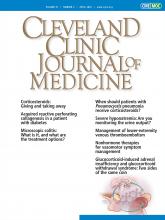ABSTRACT
No specific data exists regarding management of patients with cystic fibrosis (CF) who are infected with COVID-19. Based on expert opinion, strategies for outpatient management include use of elexacaftor-tezacaftor-ivacaftor to reduce pulmonary exacerbations, telemedicine, adherence to prescribed regimens, prompt and aggressive treatment of CF exacerbations, and communication about COVID-19 with patients with CF. Strategies for inpatient management may vary due to special precautions to avoid the aerosolization of COVID-19 with the use of nebulized medications and other therapies.
INTRODUCTION
There are no specific data regarding management of patients with cystic fibrosis (CF) who are infected with COVID-19; thus, this commentary is based on expert opinion. While this commentary is focused on CF, many of the suggestions are also applicable to patients with bronchiectasis, irrespective of the underlying etiology.
STRATEGIES FOR OUTPATIENT MANAGEMENT: KEEP PATIENTS OUT OF THE HOSPITAL
Elexacaftor-tezacaftor-ivacaftor, approved by the US Food and Drug Administration on October 31, 2019, has resulted in a significant reduction in pulmonary exacerbations in CF.1 Anecdotally, CF centers throughout the United States have noticed fewer hospital admissions since its introduction, and this is particularly beneficial to CF patients during the COVID-19 pandemic.
Other things we can do to keep patients safe by keeping them out of the hospital:
Practice telemedicine. CF centers are developing processes to conduct clinic visits with the entire team using telehealth,2 simplified by the recent ruling that non-HIPAA-compliant technology is allowed. Using home spirometers and pulse oximeters and mailing sputum samples to the clinic are ways to supplement information usually provided in the clinic setting.
Reinforce adherence to already prescribed regimens of exercise, airway clearance, anti-inflammatory drugs, antibiotics, and modulator therapy. This is a key strategy to maintain lung health,3 especially for motivated patients looking for “anything else they can do to stay healthy.”
Treat CF exacerbations promptly and aggressively with increased airway clearance and oral antibiotics to prevent hospital admission. For those with a more severe pulmonary exacerbation, a course of intravenous antibiotics at home should be considered, if feasible.
Communicate with CF patients through video sessions, e-mail blasts, and social media about your thoughts on COVID-19 and changes to your CF center process to further support your CF community and facilitate dissemination of accurate information.
The CF Foundation (www.cff.org/) strongly recommends that adults with CF work remotely whenever possible.
SHOULD IBUPROFEN AND CORTICOSTEROIDS BE AVOIDED?
The data are anecdotal,4 and no strong link between worse outcomes in COVID-19 and ibuprofen has been described. Out of an abundance of caution, acetaminophen can be used instead of ibuprofen for acute symptoms such as fever or pain. However, high-dose ibuprofen as a treatment for CF lung disease may be continued and reassessed on an individual basis.
The data regarding corticosteroids in COVID-19 are from the critically ill. Therefore, CF patients with asthma or allergic bronchopulmonary aspergillosis requiring oral or inhaled corticosteroids should continue at the lowest dose required to maintain health.
IF PATIENTS WITH CF MUST BE HOSPITALIZED
Nebulized medications are vital and irreplaceable for patients with CF; however, nebulization can result in aerosolization of COVID-19 in a patient who is infected. Therefore, for patients who can do it themselves, hospitals may change the procedure to have nurses or respiratory therapists bring in the nebulized medications and then have the patients self-administer their nebulizer treatments when no one else is in the room.
Given the frequent and long nebulization time required, CF patients may be prioritized for negative-pressure rooms.
If multiple options exist, favor intravenous antibiotics that require less frequent administration.
The role of inhaled antibiotics during an acute pulmonary exacerbation is controversial,5 and holding inhaled antibiotics altogether or considering using inhaled tobramycin powder would be reasonable.
Treatment of acute hypoxemic respiratory failure in a COVID-19-positive CF patient may differ from that for a COVID-19-positive non-CF patient.
A recently published multinational report of COVID-19 in CF showed good recovery, and the disease course did not seem to differ from that in the general population.6
Many CF patients now survive emergency invasive mechanical ventilation (as may occur in a CF patient infected with COVID-19), and the diagnosis of CF should not automatically rule out ventilation.7,8
Airway clearance in CF during invasive mechanical ventilation can be challenging; thus, we favor a high-flow nasal cannula with awake proning as opposed to early intubation, which is being advocated in some intensive care units.
Hypertonic saline, dornase alfa, and antibiotics can be delivered through the endotracheal tube via a closed system, so these vital medications can still be delivered without risk of aerosolization.
Bronchoscopy is a common therapeutic procedure during invasive mechanical ventilation in intubated CF patients; however it may be avoided or delayed, given the risks associated with aerosolization in a COVID-19-positive patient.
RESOURCES
Cystic Fibrosis Foundation
Update on COVID-19 (www.cff.org/News/News-Archive/2020/Update-on-COVID-19/)
Q & A for the CF community (www.cff.org/Life-With-CF/Daily-Life/Germs-and-Staying-Healthy/What-Are-Germs/ COVID-19-Community-Questions-and-Answers/)
Centers for Disease Control and Prevention
Specific guidance for high-risk patients (www.cdc.gov/coronavirus/2019-ncov/need-extra-precautions/people-at-higher-risk.html?CDC_AA_refVal=https%3A%2F%2Fwww.cdc.gov%2Fcoronavirus%2F2019-ncov%2Fspecific-groups%2Fhigh-risk-complications.html)
What to do when you are sick (www.cdc.gov/coronavirus/2019-ncov/if-you-are-sick/steps-when-sick.html)
Footnotes
The statements and opinions expressed in COVID-19 Curbside Consults are based on experience and the available literature as of the date posted. While we try to regularly update this content, any offered recommendations cannot be substituted for the clinical judgment of clinicians caring for individual patients.
- Copyright © 2020 The Cleveland Clinic Foundation. All Rights Reserved.









